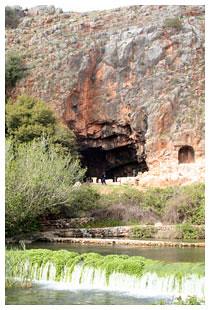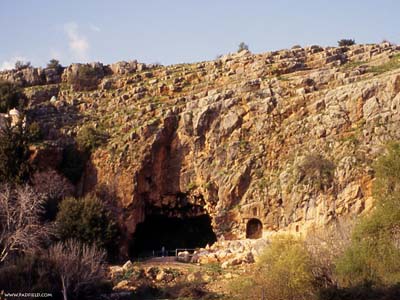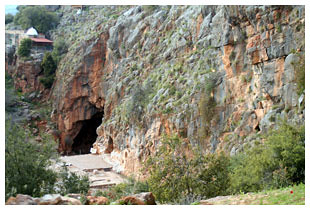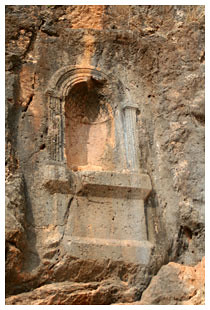Difference between revisions of "Upon this Rock I will build my Congress"
From SaveTheWorld - a project of The Partnership Machine, Inc. (Sponsor: Family Music Center)
| (One intermediate revision by the same user not shown) | |||
| Line 24: | Line 24: | ||
<blockquote>By the early first century, Caesarea Philippi (named in 2 AD by Herod Philip in honor of Caesar Augustus) was reviled by orthodox rabbis, and it was taught that no good Jew would ever visit there.</blockquote> | <blockquote>By the early first century, Caesarea Philippi (named in 2 AD by Herod Philip in honor of Caesar Augustus) was reviled by orthodox rabbis, and it was taught that no good Jew would ever visit there.</blockquote> | ||
| − | <blockquote>In the center of the Rock of the Gods is a huge cave, from which a stream flowed (after 19th century earthquakes, the stream began flowing out from the rock beneath the mouth of the cave). ... In the open-air Pan Shrine, next to the cave mouth, there was a large niche, in which a statue of Pan (a half-goat, half-human creature) stood, with a large erect phallus, worshipped for its fertility properties. Surrounding him in the wall were many smaller niches, in which were statues of his attending nymphs. On the shrine in front of these niches, worshippers of Pan would congregate and partake in bizarre sexual rites, including copulation with goats – worshipped for their relationship to Pan. - ( | + | <blockquote>In the center of the Rock of the Gods is a huge cave, from which a stream flowed (after 19th century earthquakes, the stream began flowing out from the rock beneath the mouth of the cave). ... In the open-air Pan Shrine, next to the cave mouth, there was a large niche, in which a statue of Pan (a half-goat, half-human creature) stood, with a large erect phallus, worshipped for its fertility properties. Surrounding him in the wall were many smaller niches, in which were statues of his attending nymphs. On the shrine in front of these niches, worshippers of Pan would congregate and partake in bizarre sexual rites, including copulation with goats – worshipped for their relationship to Pan. - (http://www.fishingtheabyss.com/archives/44) “Why context is important – the lesson of Caesarea Philippi”] (June 2021: no longer posted)</blockquote> |
It wasn’t just disgusting. It was dangerous. Mobs which trust myths can become violently intolerant of “fanatics” who do not. Especially fanatics who talk. | It wasn’t just disgusting. It was dangerous. Mobs which trust myths can become violently intolerant of “fanatics” who do not. Especially fanatics who talk. | ||
| Line 52: | Line 52: | ||
The place which Jesus had chosen as a metaphor for the afterlife of the wicked was [https://bible.knowing-jesus.com/search?q=gehenna&translation=all Gehenna], a valley outside Jerusalem which had been desecrated in the past as a place of child sacrifice to Baal, and was used in Jesus’ time as a garbage dump where garbage was burned with perpetual fires. | The place which Jesus had chosen as a metaphor for the afterlife of the wicked was [https://bible.knowing-jesus.com/search?q=gehenna&translation=all Gehenna], a valley outside Jerusalem which had been desecrated in the past as a place of child sacrifice to Baal, and was used in Jesus’ time as a garbage dump where garbage was burned with perpetual fires. | ||
| − | Cleansing Israel of that unspeakable cruelty took invasions of the Greeks, followed by invasions of the Romans. Human sacrifice disgusted them both, although [https://www.smithsonianmag.com/smart-news/did-ancient-greeks-engage-human-sacrifice-180960111/ not enough] to completely stamp it out. A Roman law passed in 81 BC characterized human sacrifice as murder committed for magical purposes. Later Rome would conquer Britain and end the human sacrifice of the Druids.[https://en.wikipedia.org/wiki/ | + | Cleansing Israel of that unspeakable cruelty took invasions of the Greeks, followed by invasions of the Romans. Human sacrifice disgusted them both, although [https://www.smithsonianmag.com/smart-news/did-ancient-greeks-engage-human-sacrifice-180960111/ not enough] to completely stamp it out. A Roman law passed in 81 BC characterized human sacrifice as murder committed for magical purposes. Later Rome would conquer Britain and end the human sacrifice of the Druids.[https://en.wikipedia.org/wiki/Religion_in_ancient_Rome#Human_sacrifice Wikipedia] |
This was where Jesus challenged His disciples to see, and say, more than most people dared even think. Here was where Jesus said, “You fear this great evil rock, thinking you are such a little rock. But against this rock I will build my Congress, and the Gates of Hell will never defeat it.” | This was where Jesus challenged His disciples to see, and say, more than most people dared even think. Here was where Jesus said, “You fear this great evil rock, thinking you are such a little rock. But against this rock I will build my Congress, and the Gates of Hell will never defeat it.” | ||
Latest revision as of 04:02, 24 June 2021
| Forum (Articles) | Offer | Partners | Rules | Tips | FAQ | Begin! | Donate |
This article was started by Dave Leach R-IA Bible Lover-musician-grandpa (talk) 22:13, 16 February 2020 (UTC). Interaction from other writers will be distinguished from my writing with horizontal lines above and below. Your response to anything you read here is most welcome. Please add your response next to what you are responding to. If your reaction is not to any specific part of this article, please add general comments on the "Discussion" page. To read the original version of this article in a .pdf document, see www.Saltshaker.US/Salt/UponThisRockIwillbuildmyCongress.pdf.
Part One: the Original Gates of Hell
They weren’t supposed to go there. Not Jews. Not there.
It was bad enough heading South to Samaria. But North, to this place?
This place where so many pagan temples were built into a cliff that it was called the “Rock of the gods”? These cruel “gods” with their orgies with children, slaves, goats, and babies left to die?
By the early first century, Caesarea Philippi (named in 2 AD by Herod Philip in honor of Caesar Augustus) was reviled by orthodox rabbis, and it was taught that no good Jew would ever visit there.
In the center of the Rock of the Gods is a huge cave, from which a stream flowed (after 19th century earthquakes, the stream began flowing out from the rock beneath the mouth of the cave). ... In the open-air Pan Shrine, next to the cave mouth, there was a large niche, in which a statue of Pan (a half-goat, half-human creature) stood, with a large erect phallus, worshipped for its fertility properties. Surrounding him in the wall were many smaller niches, in which were statues of his attending nymphs. On the shrine in front of these niches, worshippers of Pan would congregate and partake in bizarre sexual rites, including copulation with goats – worshipped for their relationship to Pan. - (http://www.fishingtheabyss.com/archives/44) “Why context is important – the lesson of Caesarea Philippi”] (June 2021: no longer posted)
It wasn’t just disgusting. It was dangerous. Mobs which trust myths can become violently intolerant of “fanatics” who do not. Especially fanatics who talk.
But there he stood. Surrounded by his trembling disciples. Talking.
Right there in Caesarea Phillipi, within sight of the cave called “The Gates of Hell”, in the bloody cliff that was devoted to the “god” Pan.
Bible Commentator Jamieson-Faussett-Brown: Caesarea Philippi — It lay at the foot of Mount Lebanon, near the sources of the Jordan, in the territory of Dan, and at the northeast extremity of Palestine. It was originally called Panium (from a cavern in its neighborhood dedicated to the god Pan) and Paneas.
Word of God Today: Herod Phillip, one of the sons of Herod the Great, ruled the area of Gaulanitis on the east side of the Jordan River. He made ancient Paneas his capital city and renamed it after Caesar Augustus. To distinguish it from the Caesarea on the Mediterranean coast it was named Caesarea Philippi. Much later, in the seventh century AD the Arabs captured the city and it reverted to its old name. Because of their difficulty in pronouncing the “P” sound, the name of the city became simply Banias as it still is today.
The cave was called “the Gates of Hell” because a spring exited the cave, and the foolish Greeks thought underground springs were portals to Hell; besides, this spring was so deep that the gullible Greeks imagined it reaching all the way down to Hell.
(Right after Peter’s confession and Jesus’ rebuke of him for arguing against accepting the Cost Jesus was preparing to pay) Then he called the crowd to him along with his disciples and said: “If anyone would come after me, he must deny himself and take up his cross and follow me. For whoever wants to save his life will lose it, but whoever loses his life for me and for the gospel will save it. What good is it for a man to gain the whole world, yet forfeit his soul? Or what can a man give in exchange for his soul? If anyone is ashamed of me and my words in this adulterous and sinful generation, the Son of Man will be ashamed of him when he comes in his Father’s glory with the holy angels.” (Mark 8:34-38)
This begs a few questions: What crowd did He call to him? Could it have been the Pan worshippers? Any crowd from this region would NOT have been religiously Jewish. Was the last statement aimed at his disciples, who might have been embarrassed at the spectacle Jesus was creating? FishingTheAbyss
How foolish! A body of water reaching all the way to Hell, indeed! Didn’t the Greeks consider that if all that water went all the way down to Hell, it would put out Hell Fire?
Actually Greeks believed Hades, their word which English Bibles translate “Hell”, featured rivers of water, not the lake of fire taught in Egypt, which would be developed a generation later in Revelation 20. This fanatic walking among them taught that Hades was full of fire, but he was not an Egyptian. He was a Jew. The Jews had no such teaching. Disorienting.
The place which Jesus had chosen as a metaphor for the afterlife of the wicked was Gehenna, a valley outside Jerusalem which had been desecrated in the past as a place of child sacrifice to Baal, and was used in Jesus’ time as a garbage dump where garbage was burned with perpetual fires.
Cleansing Israel of that unspeakable cruelty took invasions of the Greeks, followed by invasions of the Romans. Human sacrifice disgusted them both, although not enough to completely stamp it out. A Roman law passed in 81 BC characterized human sacrifice as murder committed for magical purposes. Later Rome would conquer Britain and end the human sacrifice of the Druids.Wikipedia
This was where Jesus challenged His disciples to see, and say, more than most people dared even think. Here was where Jesus said, “You fear this great evil rock, thinking you are such a little rock. But against this rock I will build my Congress, and the Gates of Hell will never defeat it.”
(Congress?!! Not “church”, but “congress”? Not upon this rock but against this rock?! I better read further, to see if this strange translation is explained!)
Matthew 16:13 When Jesus came into the coasts of Caesarea Philippi, he asked his disciples, saying, Whom do men say that I the Son of man am? 14 And they said, Some say that thou art John the Baptist: some, Elias; and others, Jeremias, or one of the prophets. 15 He saith unto them, But whom say ye that I am? 16 And Simon Peter answered and said, Thou art the Christ, the Son of the living God. 17 And Jesus answered and said unto him, Blessed art thou, Simon Barjona: for flesh and blood hath not revealed it unto thee, but my Father which is in heaven. 18 And I say also unto thee, That thou art Peter, and upon this rock I will build my church; and the gates of hell shall not prevail against it. 19 And I will give unto thee the keys of the kingdom of heaven: and whatsoever thou shalt bind on earth shall be bound in heaven: and whatsoever thou shalt loose on earth shall be loosed in heaven. 20 Then charged he his disciples that they should tell no man that he was Jesus the Christ.
Yet here was this man, this madman, insulting the Greeks and Romans who had done such kindness to Israel, upending their very doctrines of Hell – claiming it was full of fire, not water – and claiming that he was going to build something that would defeat the very Gates of Hell!
For Jesus to own [acknowledge, claim] in Caesarea Philippi the titles Son of the living God as well as Son of Man would upend all of the pagan notions associated with the location. Further, Jesus soon commenced teaching them about a radically different death and resurrection from the myth that enshrouded the Baal narratives (Matt 16:21). "Caesarea Philippi and the gates of hell"
There was only one thing to do with this strange Jesus: embarrass him. Embarrass him, they did, choosing to offer, right in front of him, another sacrifice to their god Hades, the god of Death. After they prepared a black sheep for slaughter, they began banging their heads on the ground to make sure Hades heard them. Wikipedia: Hades That devotion and wisdom would be sure to impress and embarrass Jesus.
In both the Old and New Testaments, it was a center of pagan worship. Mount Hermon itself had been called Baal Hermon after the Canaanite storm god Baal, who was said to live on the mountain (Judges 3:3). Even after the Israelites took it over from the Canaanites, an Israelite king set up a worship center there with a golden calf (1 Kgs 12:25–33). There was a temple dedicated to Pan there in New Testament times, as well as a temple dedicated to Caesar Augustus. Pan was a symbol of fertility, and there was a statue of Pan with a huge removable penis that would be paraded around during festivals. "Caesarea Philippi and the gates of hell".
But the disciples were horrified at Jesus’ reaction: disgust mixed with profound sadness at their perverted “preparations”, and when they began their head-banging, laughter! They would have laughed themselves, safe at home. But here, in this place crawling with Hades worshipers and heavily armed Romans?
Jesus was going to build something that was going to defeat this?
What was it Jesus said He would build – a congress? Here in Greek territory, Jesus used the Greek word εκκλησιαν, which is where the free men of a whole Greek city meet several times a year to conduct city business. They “congregate” together, so their meeting is called a “congregation”, or “congress” for short, to indicate that their business is governing themselves.
(Part Four shows how Tyndale in 1526 translated the Greek word “congregation”, but King James specifically ordered his translators to use the word “church”.)
So was Jesus saying, wondered His disciples, that He would build an organization like the εκκλησιαν in which whole populations of cities congregate to govern themselves? That’s not going to sit well with the mobs back in Israel! Like their ancestors in 1 Samuel 8:20, they are waiting for a King who will fight their battles, killing the Roman soldiers so they won’t be under the Roman dictator any longer. They want their very own dicta... – uh, king. The folks back home don’t want to have to govern themselves.
But εκκλησιας weren’t particularly armed. How could an unarmed Congress defeat these armed pagans, the disciples wondered? Also, εκκλησιας consisted of free, thinking men. These barbarians were crazy. They lived to die. They lived to spill blood, and didn't care if it was their own. How do you defeat terrorists who think the worst that can happen to them is to be killed and taken straight to army Heaven? Oh well, that only describes nearly every enemy from whom God delivered Israel over the centuries. But that only worked when the people trusted God. The disciples were seeing mixed signals whether that would ever happen again.
(Story continues at Part Two: WHICH "Rock"?)



